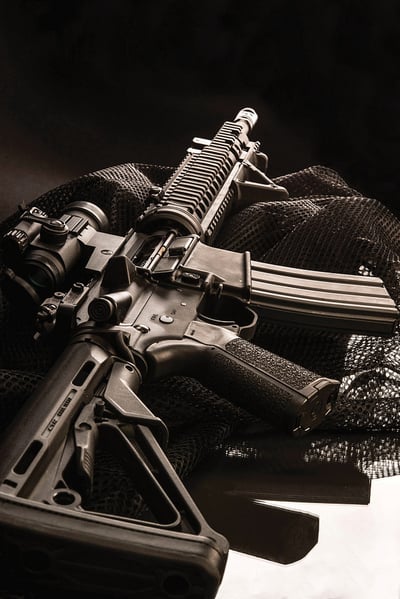SANCtUARY
SELECT SERVICES, LLC
Firearms and Preparedness Training
Iowa Educators Professional Concealed Carry Permit Course
Purpose: The Iowa Department of Public Safety has established rigorous training requirements to ensure your safety and preparedness. Our comprehensive program includes both initial and ongoing training components, providing you with the highest quality education and skills necessary to confidently carry weapons in a professional setting. This specialized training not only enhances your personal security but also empowers you to create a safer learning environment for your students. By investing in this premium training, you are elevating your professional standards and demonstrating your commitment to excellence.
Key Topics Covered
Initial Training Requirements
-
Standard Handgun Safety Training: Applicants must first complete the standard handgun safety training required for any Iowa carry permit, as outlined in Iowa Code 724.9. Iowa Department of Public Safety
-
Additional Training for Educators:
-
Firearms Training: A minimum of 20 hours of in-person firearms training, covering weapon safety, handling, and a course of fire.
-
Legal Training: One-time in-person legal training, including topics such as qualified immunity.
-
Emergency Medical Training: At least 3 hours of annual in-person training, including CPR and AED use. American Heart Association CPR/AED/First Aid Certified Instructor
-
Communication Training: At least 2 hours of annual in-person training on de-escalation and crisis intervention techniques. Includes what and how to relay information to emergency response personnel
-
Live Scenario Training: At least 12 hours of annual in-person scenario-based training, covering critical incident response and weapon retention. Iowa Administrative Rules
-
Ongoing Training Requirements
To maintain the Educator Professional Permit, holders must complete the following annual trainings:
-
Emergency Medical Training: As described above.
-
Communication Training: As described above.
-
Live Scenario Training: As described above.
-
Quarterly Firearms Training: Continued firearms training every quarter to maintain proficiency. Iowa Administrative Rules
Additional Considerations
-
School Approval: Even with the permit, educators must have approval from their school district, private school, or institution of higher education to carry firearms on school grounds.
-
Insurance Implications: As of August 2024, no permits had been issued under the new law, partly due to uncertainties about insurance coverage for schools that allow staff to carry firearms.
-
Funding for Training: In March 2024, the Iowa House passed legislation creating a $3 million grant program to assist schools with costs related to firearm training and equipment for staff.
For more detailed information and updates, you can visit the Iowa Department of Public Safety's website.





USCCA Concealed Carry and Home Defense Fundamentals (CCHDF)
Purpose:
The CCHDF course is designed to educate responsibly armed Americans on the legal, ethical, and tactical aspects of carrying a firearm for self-defense, as well as defending oneself and one’s family in the home.
Key Topics Covered
-
Self-Defense Mindset
-
Situational awareness
-
Conflict avoidance
-
Mental preparedness
-
-
Firearms Basics
-
Types of firearms and ammunition
-
Gun safety rules
-
Firearms operation and maintenance
-
-
Shooting Fundamentals
-
Grip, stance, sight alignment, trigger control
-
Defensive shooting vs. marksmanship
-
-
The Legal Use of Force
-
When you can and cannot use deadly force
-
Legal aftermath of a self-defense incident
-
Understanding “reasonable force,” “imminent threat,” and “duty to retreat”
-
-
Violent Encounters & Aftermath
-
What happens during a self-defense incident
-
How to interact with law enforcement
-
Emotional, legal, and financial aftermath
-
-
Home Defense Planning
-
Securing your home
-
Creating a family defense plan
-
Use of safe rooms and communication strategies
-
-
Concealed Carry Lifestyle
-
Holsters, clothing, and carrying methods
-
Situational awareness while carrying
-
Responsible firearm storage and transportation
-
This Class is For:
- Anyone who intends to carry a firearm whether concealed or open.
- New firearm owners interested in the basics of ownership and safety.
- Anyone wanting to improve their own personal safety.





USCCA Women’s Handgun & Self-Defense Fundamentals (WHSDF)
Purpose: This course is a comprehensive training program designed to empower women with the knowledge and skills necessary for responsible firearm ownership and self-defense. Developed by Beth Alcazar, a seasoned firearms instructor and USCCA Senior Training Counselor, the course caters to women at all experience levels—from complete beginners to those seeking to enhance their defensive shooting capabilities.
Course Overview
The WHSDF program is structured into three progressive levels:
-
Level 1: Basic
-
Introduction to handgun safety and operation.
-
Understanding different types of handguns and ammunition.
-
Fundamentals of marksmanship and safe handling practices.US Concealed Carry Training+1US Concealed Carry Training+1Salomon Firearms Training
-
-
Level 2: Intermediate
-
Building upon basic skills with more advanced shooting techniques.
-
Addressing common malfunctions and maintenance.
-
Developing situational awareness and threat assessment.
-
-
Level 3: Defensive
-
Advanced defensive shooting strategies and tactics.
-
Legal considerations and the use of deadly force.
-
Creating personalized self-defense plans.
-
Each level is designed to be engaging and supportive, fostering a learning environment where women can build confidence and competence in their self-defense journey.
This Class is For:
- New to advanced female gun owners.
- Any female wanting to improve their own personal safety.




AR-15 Fundamentals
Gain an understanding of the usefulness an AR-15 provides for civilian defense while receiving cutting-edge AR-15 training through in-person classroom learning and range training.
This Class is For:
- All experience levels welcome.
- Firearm owners interested in the basics of AR-15 ownership and safety.
- Anyone wanting to improve their own personal safety.

AHA CPR / AED / First Aid
The American Heart Association's Heartsaver® CPR/AED/First Aid course is designed for the general public — including teachers, coaches, workplace responders, and anyone who wants to be prepared for emergencies.
CPR (Cardiopulmonary Resuscitation)
-
Adult, Child, and Infant CPR
-
Chest compressions and rescue breaths
-
Hands-only CPR techniques
-
Choking relief (Heimlich maneuver)
AED (Automated External Defibrillator)
-
What an AED is and how it works
-
Step-by-step AED operation
-
Safety precautions while using an AED
-
AED use for adults and children
First Aid
-
Basic wound care: bleeding, cuts, burns, bites
-
Managing medical emergencies: seizures, diabetes, allergic reactions, strokes
-
Injury emergencies: broken bones, sprains, head injuries
-
Environmental emergencies: heatstroke, hypothermia, poisoning
This Class is For:
- All experience levels welcome.



USCCA – Countering the Mass Shooter Threat (CTMST)
Purpose:
The CTMST course by the United States Concealed Carry Association (USCCA) is designed to help civilians, security teams, schools, churches, and businesses prepare for, prevent, and respond to active shooter situations.
Core Topics Covered:
-
Understanding the Threat
-
In-depth analysis of historical mass shootings
-
Identifying common patterns and motives of attackers
-
Data-driven insights on how long incidents last and how they typically end
-
-
Creating an Emergency Operations Plan (EOP)
-
Step-by-step guide to building a custom plan for schools, churches, businesses, and other organizations
-
Communication, evacuation, lockdown, and reunification procedures
-
-
Threat Mitigation Strategies
-
Warning signs of potential attackers
-
Behavioral indicators and red flags
-
Importance of early intervention
-
-
Effective Response Tactics
-
What to do during an attack: Run, Hide, Fight
-
Roles of armed civilians and law enforcement
-
Medical response: treating the wounded, stopping the bleed
-
-
Post-Incident Recovery
-
Securing the scene
-
Mental health considerations
-
Legal and media response
-
Special Focus Areas
-
Church and school safety planning
-
Business-specific scenarios
-
Coordinating with local law enforcement
Who Is It For?
-
Educators and school administrators
-
Faith-based organizations
-
Business owners and security teams
-
Everyday civilians who want to be prepared
No tactical experience is necessary — it's accessible for anyone interested in proactive safety.





USCCA Church Safety: Protecting Your Congregation
Purpose: This course is designed to equip houses of worship with the knowledge and strategies necessary to enhance security and ensure the safety of their congregations. This training focuses on proactive measures to prevent, recognize, and respond to potential threats, including active shooter situations.
Course Overview
This course provides guidance on:
-
Early Threat Detection: Recognizing behavioral indicators and warning signs of potential threats.
-
Emergency Operations Planning: Developing and implementing a comprehensive Emergency Operations Plan (EOP) tailored to your place of worship.
-
Active Shooter Response: Understanding appropriate actions during an active shooter event to increase survival chances.
-
Security Assessment: Evaluating current security measures and identifying areas for improvement.
-
Team Coordination: Organizing and training safety teams to effectively manage emergencies.US Concealed Carry Training+1christianwarriortraining.com+1
Course Format
-
In-Person Training: Led by certified USCCA instructors, offering hands-on experience and personalized guidance.US Concealed Carry Training
Who Should Attend?
This course is ideal for:
-
Church leaders and administrators
-
Security team members
-
Volunteers involved in safety planning
-
Congregants interested in enhancing their personal and community safety


Real Estate Agent Safety
The real estate industry is hardly the most violent industry in the world. What makes those in the real estate business vulnerable is frequently going into private places, people’s homes, and often alone. Open houses are effective real estate strategies—and they involve dealing with a lot of strangers.
It’s worth it to take every safety precaution you can. You’re likely to have a very long career. You’ll be in risky situations and you need to know how to extract yourself from a dangerous situation.
Most sellers and prospective buyers you meet are going to be nothing but earnest and friendly. Learn how to identify the potentially dangerous clients — those who cross boundaries, who want too much personal information, or just make you feel uncomfortable.
This Class is For:
- Real Estate Agents that meet perspective buyer or sellers alone.

Individual Training
Individual handgun, shotgun, or rifle training can significantly enhance your personal skills through the focused attention available in one-on-one or semi-private settings. This personalized training can lead to noticeable improvements in both basic and advanced skill sets. The individualized attention to your gun handling skills fosters a positive and comfortable learning environment, conducive to rapid improvement within a compressed timeframe.
Individual range instruction can cover various topics tailored to your specific areas of interest, including firearm safety, firearm handling, and the basic fundamentals of shooting. Additionally, we will cover drawing, reloading, malfunction clearing, use of cover, engaging multiple targets, and tactical flashlight options.
This Class is For:
- Anyone that want to improve their training but isn't comfortable in groups.
- People that may want to develop or improve a skill set that isn't covered in the other class offerings.

General Preparedness (Prepping)
Are you ready to start preparing for emergencies or disasters? You've probably had some things go wrong in life already. While experience teaches us a lot, it's hard to be ready for everything. There are many things that can go wrong, and we can't list them all. But we can help you make a plan (or plans), whether written or spoken, big or small, single or multiple. These plans need to be shared and practiced.
We'll help you identify threats, decide which ones to address, and prioritize them. Start with the most important threats and plan accordingly. We'll also explain what a Bug Out Bag is, what you need in your Bug Out Vehicle, and what you need to stay in place during an emergency.
This Class is For:
- Anyone wanting to be better prepared for minor or major critical events.
- Anyone that is just beginning or trying to make sure they are as prepared as they can be.

Sanctuary Select Services, LLC Training and Preparation Policy
Sanctuary staff take firearms, security, and personal protection very seriously. Safety is the number one priority when training with and using firearms. Sanctuary's mission is to provide new firearms owners with the knowledge and understanding to handle and use a firearm, and offer additional knowledge to others seeking to improve their skills. The goal is to not only have fun shooting but to understand the risks and rewards of firearms ownership. Proper training on general firearms terms, personal firearms, safety, federal, state, and local laws, and when to use a firearm is critical. Sanctuary wants every student to become more knowledgeable, competent, confident, safe, and ready to defend themselves and their loved ones. Sanctuary training staff are certified by the United States Concealed Carry Association and The American Heart Association.
Safety:
We will always emphasize the importance of safety and the four basic rules for the handling of firearms. If a student is found being unsafe, reckless, or irresponsible while handling a firearm they will be warned. If that behavior continues they will be removed from the classroom or range. No refunds will be offered for students removed for violations of firearms safety.
Ear and eye protection is required when conducting live fire training. Additional protective gear may be used as needed. Highly recommend wearing long pants and close toed footwear for live fire training. Additional items such as hat, sunscreen, long sleeve shirts, etc, are seasonally dependent as are coats and gloves.
Fees:
All fees can be found on the Sanctuary Select Services, LLC page on USCCA. Click on the link at the top of the page.
Payment:
Appoints must be paid for at the time of scheduling. If other arrangements may be necessary, please contact Sanctuary.
Cancellation Policy:
Cancelation of appointments must be done at least 24 hours in-advance to request a refund. Appointments may be rescheduled the day of the appointment based on availability. Refunds are not available for not showing for on-line or in-person sessions. Special cases will be considered on a case by case basis. Occasionally dates may need to be changed due to weather, if this happens every attempt will be made to reschedule dates to meet the needs of the registered students.